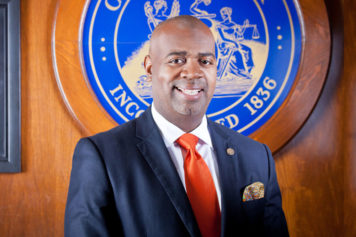After all the screaming and shouting, City Councilman Ras Baraka was elected by a large margin as the next mayor of Newark, with residents in this perennially troubled city opting to side with a man whose family name has been synonymous with Newark for the past 40 years.
Growing up in the household of legendary poet and playwright Amiri Baraka, Ras Baraka in many ways has been preparing for this moment his entire life, grooming himself as a deputy mayor under Sharpe James, principal of Central High School, and city councilman. It was a fitting way to cement his father’s legacy just five months after Amiri Baraka died at age 79 and was sent off with a glorious funeral in his birth city of Newark.
Baraka, 44, easily bested an upstart but well-financed opponent, 39-year-old Seton Hall law professor Shavar Jeffries, winning 54 percent of the vote; Jeffries received 46 percent.
Jeffries had the backing of Wall Street money, in addition to support from the likes of Republican Gov. Chris Christie, and two Democratic power brokers in the state, George E. Norcross of South Jersey and Joseph DiVincenzo, the Essex County executive.
It was the kind of monied coalition that former Mayor Cory Booker, now a U.S. senator, used to put together in winning two terms. But in the end, it wasn’t enough to overcome Baraka’s deep historical roots and name recognition in Newark.
Ras Baraka has been in the public eye for a long time. While he was a Newark schoolteacher, hip-hop artist Lauryn Hill used Baraka’s deep baritone during interludes on her seminal 1999 album, “The Miseducation of Lauryn Hill,” recording bits from Baraka’s talks to students about subjects like love.
The contentious campaign between Baraka and Jeffries featured charges of vandalism and ugly rhetoric. But at his election-night party, Jeffries praised Baraka’s “deep and abiding love” for Newark and said, “The time for fighting is over.”
“We are the mayor!” Baraka shouted at his victory party. According to reports, he had a six-piece funk band jamming on stage, playing an original song that included the line, “Who did we vote for? Raaaaas Baraka.”
“The people of Newark are not for sale,” Baraka said, alluding to the support Jeffries received from outsiders. They were the same allegations Booker had to contend with for years as mayor of the troubled city.
“Baraka’s win suggests that the Booker years didn’t vanquish the old guard,” Andra Gillespie, a professor at Emory University and author of “The New Black Politician: Cory Booker, Newark and Post-Racial America,” told the New York Times. The newspaper was quick to list the problems confronting Baraka:
“The city has its highest murder rate in 24 years, and its unemployment rate is 13 percent. There is a $93 million budget deficit, and the state has warned that it may take over the city’s rickety finances.”

